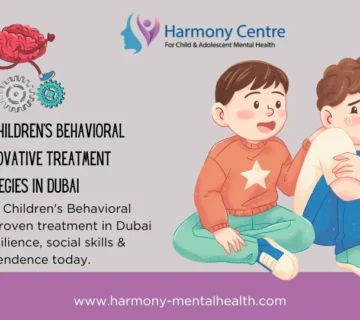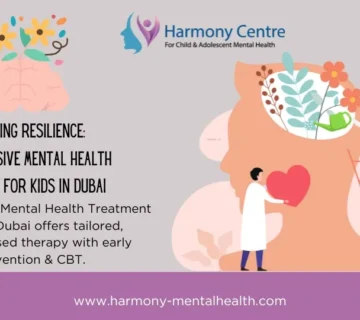Child Social Anxiety Dubai: Effective Strategies to Help Your Child Overcome Shyness
Understand and manage child social anxiety in Dubai at Harmony Centre. Learn evidence‑based strategies to help shy children build confidence and ease social interactions.
Contact Information
| Contact Method | Details |
|---|---|
| Phone | +971 (52) 8773268 / 04 558 2015 |
| Click Here | |
| info@harmony-mentalhealth.com | |
| Address | Office 409, Building Alrazi-64C, 26th St, Healthcare City, Dubai |
Introduction
In Dubai’s bustling, multicultural environment, many children face challenges when it comes to interacting with peers and participating in group activities. Child social anxiety Dubai is a common issue that can affect academic performance, emotional well‑being, and overall quality of life. At Harmony Centre Mental Health Dubai, we offer comprehensive, evidence‑based solutions to help children overcome shyness and develop healthy social skills. Our multidisciplinary team works closely with families, educators, and community partners to create a supportive environment where every child can build the confidence needed to thrive socially and academically.
Learn More About Harmony Centre • Contact Us
Understanding Child Social Anxiety
What Is Social Anxiety in Children?
Social anxiety in children refers to an intense fear or apprehension about social interactions and performance situations. Unlike typical shyness, social anxiety can be debilitating, causing children to avoid situations where they feel they may be judged or embarrassed. Key indicators include:
- Extreme Shyness:
A persistent fear of speaking in public or engaging in group activities. - Physical Symptoms:
Manifestations such as rapid heartbeat, sweating, or trembling when facing social situations. - Avoidance Behaviors:
Reluctance to attend school, participate in extracurricular activities, or engage in social gatherings. - Negative Self-Perception:
Constant worry about being rejected or judged by peers. - Impaired Social Functioning:
Difficulties in making friends and forming relationships, which can lead to isolation.
Causes of Child Social Anxiety
Social anxiety in children can be influenced by several factors:
- Genetic Predisposition:
A family history of anxiety disorders may increase the risk. - Environmental Stressors:
Experiences such as bullying, high academic pressure, or significant life changes can trigger anxiety. - Overprotective Parenting:
Excessive control or criticism may limit a child’s opportunities to develop social skills. - Cultural Expectations:
In a diverse city like Dubai, varying cultural norms may contribute to social uncertainty. - Developmental Factors:
Some children may simply develop anxiety due to their unique temperament or early experiences.
Understanding these causes is essential for implementing effective strategies to manage social anxiety.
The Impact of Social Anxiety on Children
Academic and Social Consequences
Social anxiety can have far‑reaching effects on a child’s life, including:
- Academic Performance:
Anxiety can interfere with concentration and participation in class, leading to poor academic outcomes. - Social Isolation:
Children may withdraw from social interactions, missing out on valuable peer relationships and learning experiences. - Emotional Well‑Being:
Persistent anxiety can lead to low self‑esteem, feelings of loneliness, and an increased risk of depression. - Family Dynamics:
Struggles with social anxiety can create tension at home, as parents may worry about their child’s future and feel uncertain about how best to help.
Long‑Term Implications
If left unaddressed, child social anxiety can persist into adolescence and adulthood, leading to ongoing challenges in personal and professional relationships. Early intervention is key to breaking this cycle and building resilience.
Our Approach to Managing Child Social Anxiety at Harmony Centre
Comprehensive Assessments
Our process begins with a thorough assessment to understand your child’s unique social challenges. This evaluation includes:
Initial Consultation
- Family History and Concerns:
We discuss your child’s developmental milestones, previous social experiences, and any observed behaviors that indicate anxiety. - Parental Input:
Detailed feedback from parents helps us understand the contexts in which your child experiences anxiety. - Preliminary Screening:
A brief assessment identifies specific triggers and areas that need further evaluation.
Standardized Testing and Behavioral Observations
- Validated Assessment Tools:
We use scientifically‑validated instruments to measure anxiety levels, social skills, and emotional regulation. - Direct Observations:
Therapists observe your child in both structured settings and natural environments (e.g., at school or during play) to capture authentic behaviors. - Collaborative Feedback:
Input from teachers and caregivers is integrated into the evaluation to provide a holistic view of your child’s social interactions.
Learn More About Our Assessment Process
Multidisciplinary Team Review
After collecting all necessary data, our multidisciplinary team meets to analyze the findings:
Collaborative Analysis
- Team Meetings:
Our child psychologists, psychiatrists, and therapists convene regularly to discuss assessment outcomes. - Diagnostic Profile:
We develop a comprehensive profile that outlines your child’s strengths, areas of concern, and specific triggers for social anxiety. - Goal Setting:
Clear, measurable objectives are established to guide the treatment plan, ensuring a focused approach to reducing social anxiety.
Culturally Sensitive Considerations
- Multilingual Support:
Our services are available in multiple languages to accommodate Dubai’s diverse community. - Respect for Cultural Norms:
We tailor our interventions to align with the cultural values and expectations of your family, ensuring that care is both respectful and effective.
Personalized Treatment Plans
Based on the comprehensive assessments, we create individualized treatment plans to address your child’s social anxiety.
Individual Counseling
- Cognitive Behavioral Therapy (CBT):
CBT is a cornerstone of our approach, helping your child identify and challenge negative thought patterns about social interactions. - Exposure Therapy:
Gradual exposure to social situations helps desensitize your child to anxiety triggers. - Mindfulness Techniques:
Guided mindfulness exercises promote relaxation and help your child remain present during social encounters.
Group Therapy and Social Skills Training
- Peer Interaction:
Group therapy sessions provide a safe environment where children can practice social skills and learn from their peers. - Role-Playing Exercises:
Structured role-playing helps children simulate social interactions and build confidence. - Positive Reinforcement:
Constructive feedback from therapists and peers reinforces successful social behaviors.
Family Involvement
- Family Counseling:
Involving the family in therapy helps create a supportive home environment where social skills can be nurtured. - Parental Workshops:
Workshops educate parents on strategies to support their child’s social development and manage anxiety at home. - Consistent Communication:
Regular follow‑up with parents and teachers ensures that progress is tracked and strategies are adapted as needed.
Digital Tools and Resources for Continuous Support
Telehealth Services
- Virtual Consultations:
Our secure telehealth platform provides flexible, continuous support, allowing for regular check‑ins without the need to travel. - Digital Assessment Tools:
Mobile apps and online platforms help monitor your child’s anxiety levels and track progress over time. - Interactive Learning Modules:
Access educational content and guided exercises that reinforce therapy techniques and promote mindfulness.
Online Support and Community Engagement
- Educational Webinars:
Participate in online workshops that offer expert advice on managing social anxiety. - Parent and Educator Forums:
Join digital communities where you can share experiences, strategies, and resources with others facing similar challenges. - Resource Libraries:
Explore our online repository of articles, videos, and guides on child social anxiety and effective intervention methods.
Explore Our Digital Resources
Get in Touch
Evidence-Based Outcomes and Success Stories
Quantitative Improvements
Our evidence-based approach has yielded significant measurable improvements:
- Reduced Anxiety Levels:
Many children show a decrease of 30–50% in social anxiety symptoms after consistent therapy. - Enhanced Social Participation:
Improved confidence leads to greater involvement in school and extracurricular activities. - Academic Benefits:
Reduced anxiety correlates with better concentration and improved academic performance.
Qualitative Success
Real-life testimonials from families and educators highlight the positive impact of our interventions:
“Since starting therapy at Harmony Centre, my daughter has become much more confident in social settings. She now participates in class and has made new friends.”
– Parent Testimonial
“The group therapy sessions were transformative. Our students not only learned valuable social skills but also developed lasting friendships that boosted their self-esteem.”
– Educator Testimonial
For more information on managing social anxiety in children, visit the National Institute of Mental Health (external link).
Practical Strategies for Success
For Families
Create a Supportive Home Environment
- Establish Regular Routines:
Use visual schedules to create consistent daily routines that reduce anxiety. - Encourage Open Dialogue:
Foster an environment where your child feels safe discussing their fears and successes. - Model Social Behavior:
Demonstrate positive social interactions and healthy communication at home.
Reinforce Therapeutic Techniques
- Practice Mindfulness:
Engage in daily mindfulness exercises to help your child manage anxiety. - Role-Play Social Scenarios:
Practice common social situations at home to build your child’s confidence. - Celebrate Progress:
Recognize and reward improvements, no matter how small, to encourage continuous growth.
For Educators
Integrate Social-Emotional Learning (SEL)
- Implement SEL Programs:
Use curricula that teach emotional regulation, empathy, and effective communication. - Facilitate Peer Interaction:
Organize group projects and class discussions that provide opportunities for social engagement. - Monitor and Support:
Keep track of students’ social interactions and provide constructive feedback to help them improve.
Collaborate with Families and Therapists
- Regular Communication:
Hold parent-teacher meetings to discuss strategies and track progress. - Provide a Safe Environment:
Create a classroom atmosphere that encourages participation and reduces the fear of judgment. - Leverage Digital Tools:
Use digital platforms to share resources and monitor social-emotional development.
For the Community
Engage in Public Awareness Campaigns
- Participate in Workshops:
Attend community seminars and workshops on child social anxiety to stay informed. - Join Support Groups:
Connect with local parent and educator groups to share experiences and strategies. - Advocate for Quality Mental Health Care:
Support initiatives that promote access to comprehensive mental health services for children.
Utilize Digital Resources
- Access Online Webinars:
Engage with expert-led webinars that offer guidance on managing social anxiety. - Leverage Social Media:
Follow reputable mental health organizations and join online forums to stay updated on best practices. - Explore Educational Content:
Utilize digital libraries and interactive tools available on our website to reinforce social skills.
Explore Our Community Initiatives
Get in Touch
Frequently Asked Questions about Child Social Anxiety Dubai
Book a Consultation Now
Contact Information
Office Address:
Office 409, Building Alrazi-64C, 26th St, Umm Hurair 2, Dubai Healthcare City, Dubai
Phone:
+971 4 558 2015
+971 5 287 73268
Email:
info@harmony-mentalhealth.com
Final Thoughts about Child Social Anxiety Dubai
Addressing child social anxiety early is critical for ensuring a child’s emotional and academic success. At Harmony Centre Mental Health Dubai, our evidence‑based, multidisciplinary approach provides the support, guidance, and practical strategies necessary to help children overcome social anxiety and build lasting confidence. By fostering a supportive home, school, and community environment, we empower children to navigate social situations with ease and thrive in every aspect of life.
Invest in your child’s future by choosing expert support for child social anxiety at Harmony Centre—a trusted partner in nurturing confident, resilient young minds in Dubai.
Learn More About Harmony Centre
Get in Touch
👉 Book a Consultation Now: Call +971 4 558 2015 or visit www.harmony-mentalhealth.com.
Join our online community and stay updated with our latest events, articles about Child Social Anxiety Dubai



